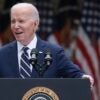Tick, tick, tick — the sound of a Congressional trade bomb. By its own, not very exacting standards, Congress has patiently waited for change in Chinese currency policy. The single most likely time for that was the G-20 finance minister’s over the weekend in South Korea. But nothing meaningful from Beijing. Again. From now until summer recess, Congress likely will be working toward punishing China.
The frustration is understandable. The U.S. has played the indispensable role in rapid Chinese economic development, if for our own reasons. We’ve received cheaper goods and a check on inflation and China has received millions of its best jobs. The combined Sino-American trade deficit over the past 30 years is roughly $2 trillion. Most of that is held in U.S. bonds, but it’s still China’s money — money that could be earned from American consumers and no one else.
In return, the PRC is uncooperative on North Korea, Iran, military-to-military contact and a host of other security issues. This is not surprising. What’s surprising is Beijing won’t even throw the U.S. a bone on most economic issues. The yuan has become a symbol of Beijing’s willingness to cooperate.
Behind closed doors, and sometimes in hearings, senior members of Congress show understanding that the value of the yuan doesn’t matter much. By far the most important factor in our long-term trade deficit is our own consumption. The most important factor in our short-term trade deficit is our budget deficit. Further, there is foreign money pouring into the U.S. that could build facilities and create jobs. Instead, it finances the deficit, which does almost nothing for jobs. Beijing costs far less in the way of American jobs than Washington does.
The PRC is hardly blameless. The entire world, led by Chinese families, is penalized in order to enlarge Chinese state firms. Regulatory, financial, land, energy, and other subsidies reserve most of the China market for perhaps one hundred centrally controlled state firms and a few hundred provincially controlled state firms. Chinese households see a very low return on their savings, land becomes wildly expensive, foreign firms cannot win Chinese customers, global energy and commodities prices rise more than they should, and so on.
As Chinese officials never tire of saying, it will take a long time for the Chinese economy to change. It will take an especially long time if one is unwilling to start. The value of the yuan is a symbol that China is serious when it talks of rebalancing, of playing a responsible role as the world’s second-largest economy.
There are still a few months for a new currency policy or, far better, meaningful changes in other Chinese policies that distort the world economy. But the Congressional clock is now ticking. Protectionist measures will not create American jobs or help the U.S. economy. They will only be an expression of exasperation, exasperation which got noticeably worse over the weekend.





























